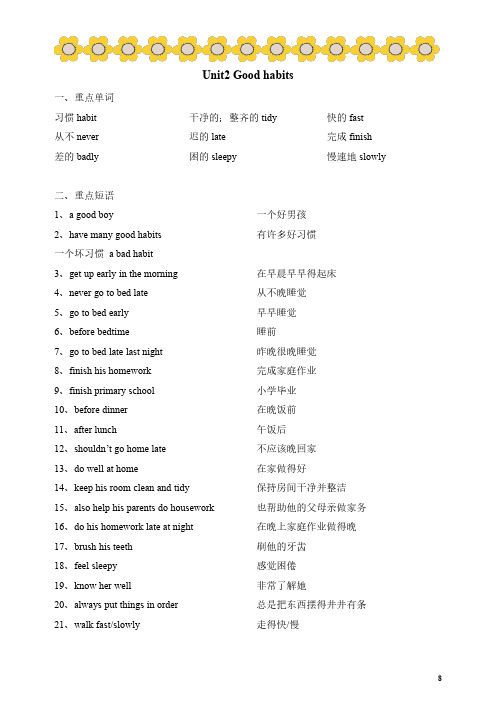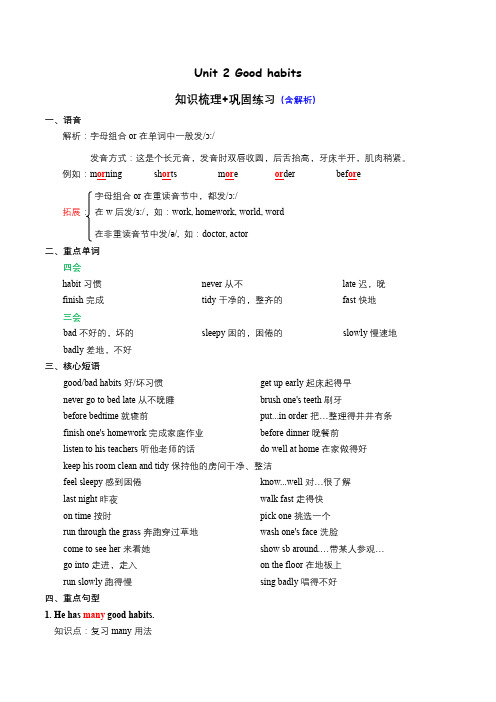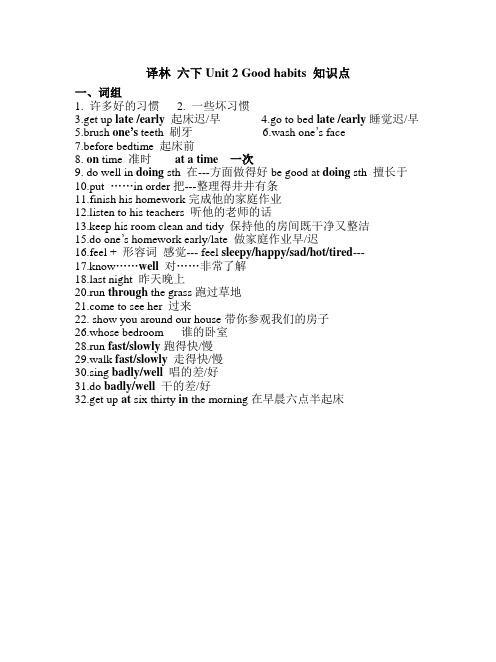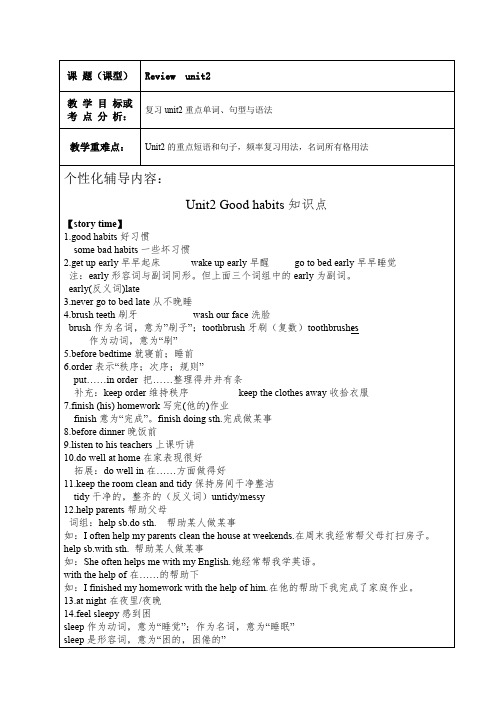六年级英语下册Unit2 Good habits知识点汇总译林版
译林版小学英语六年级下册第二单元知识点

Unit2Good habits一、重点单词习惯habit干净的;整齐的tidy快的fast从不never迟的late完成finish差的badly困的sleepy慢速地slowly二、重点短语1、a good boy一个好男孩2、have many good habits有许多好习惯一个坏习惯a bad habit3、get up early in the morning在早晨早早得起床4、never go to bed late从不晚睡觉5、go to bed early早早睡觉6、before bedtime睡前7、go to bed late last night昨晚很晚睡觉8、finish his homework完成家庭作业9、finish primary school小学毕业10、before dinner在晚饭前11、after lunch午饭后12、shouldn’t go home late不应该晚回家13、do well at home在家做得好14、keep his room clean and tidy保持房间干净并整洁15、also help his parents do housework也帮助他的父母亲做家务16、do his homework late at night在晚上家庭作业做得晚17、brush his teeth刷他的牙齿18、feel sleepy感觉困倦19、know her well非常了解她20、always put things in order总是把东西摆得井井有条21、walk fast/slowly走得快/慢22、run very fast跑得非常快23、listen to his teacher at school在学校听老师讲24、have breakfast on time准时吃早饭25、short horses矮矮的马26、run through the grass(跑)穿过草丛27、wash your face at seven o’clock在七点洗你的脸28、come to see her来看她29、show you around the house带你参观房子30、go into the living room进入起居室31、big and clean又大又干净32、small and nice小而干净33、a lot of books and toys许多书和玩具34、on the floor在地上35、under the bed在床下36、put your books and toys in order把你的书和玩具整理好37、sing badly唱得不好38、do badly做得不好39、swim well游得好40、pick one挑一个41、pick up捡起来(pick it up/pick them up)42、pick apples摘苹果43、in the street在街上三、重要知识点动词第三人称单数变化规则(1)直接在动词后+slike-likes play-plays(2)以s,x,sh,ch接尾的动词+eswash-washes watch-watches brush-brushes(3)以辅音+o接尾的动词:+esgo-goes do-does(4)以辅音+y接尾的动词:变y为i+esfly-flies study→studiesEg:用所给词的适当形式填空(一般现在时)1.She______(do)homework by herself.2.Jack______(go)home by bike.3.The giant______(climb)up the beanstalk(豆茎).4.Her mum______(run)to the goose.5.He______(do not)like apple副词和频率副词1.副词的分类I always have breakfast on time.(on time意为“按时,准时”)(1)时间副词:常见的有now,then,soon,ago,lately,later,before,early,today,tomorrow, yesterday,tonight,suddenly,still,just等。
六年级下册英语 Unit 2 Good habits知识梳理+巩固练习 译林版三起

Unit 2 Good habits知识梳理+巩固练习(含解析)一、语音解析:字母组合or在单词中一般发/ɔ:/发音方式:这是个长元音,发音时双唇收圆,后舌抬高,牙床半开,肌肉稍紧。
例如:m or ning sh or ts m or e or der bef or e字母组合or在重读音节中,都发/ɔ:/拓展:在w后发/ɜ:/,如:work, homework, world, word在非重读音节中发/ə/, 如:doctor, actor二、重点单词四会habit习惯never从不late迟,晚finish完成tidy干净的,整齐的fast快地三会bad不好的,坏的sleepy困的,困倦的slowly慢速地badly差地,不好三、核心短语good/bad habits好/坏习惯get up early起床起得早never go to bed late从不晚睡brush one's teeth刷牙before bedtime就寝前put...in order把…整理得井井有条finish one's homework完成家庭作业before dinner晚餐前listen to his teachers听他老师的话do well at home在家做得好keep his room clean and tidy保持他的房间干净、整洁feel sleepy感到困倦know...well对…很了解last night昨夜walk fast走得快on time按时pick one挑选一个run through the grass奔跑穿过草地wash one's face洗脸come to see her来看她show sb around.…带某人参观…go into走进,走入on the floor在地板上run slowly跑得慢sing badly唱得不好四、重点句型1. He has many good habits.知识点:复习many用法用法:many+可数名词复数a lot of +可数名词复数/不可数名词much+不可数名词例:教室里有很多学生。
六年级英语下册Unit2Goodhabits知识点汇总译林版

六年级英语下册Unit2 Gd habits知识点汇总译林版六年级英语下册Unit2Gdhabits知识点汇总译林版一、四会单词1、habit习惯2、tid干净的;整齐的3、fast快的4、never从不、late迟的6、finish完成二、三会单词与词组把……放得井井有条put…inrder不好的,坏的bad困的,困倦的sleep昨夜lastnight走进,走入gint慢速地sll差地,不好badl三、短语积累:1、agdb一个好男孩2、haveangdhabits有许多好习惯一个坏习惯abadhabit3、getupearlintherning在早晨早早得起床4、nevergtbedlate从不晚睡觉、gtbedearl早早睡觉6、befrebedtie睡前7、gtbedlatelastnight昨晚很晚睡觉8、finishhisher完成家庭作业9、finishpriarshl小学毕业10、befredinner在晚饭前11、afterlunh午饭后12、shuldn’tghelate不应该晚回家13、dellathe在家做得好14、eephisrleanandtid保持房间干净并整洁1、alshelphisparentsdhuser也帮助他的父母亲做家务16、dhisherlateatnight在晚上家庭作业做得晚17、brushhisteeth刷他的牙齿18、feelsleep感觉困得19、nherell非常了解她20、alasputthingsinrder总是把东西摆得井井有条21、alfast/sll走得快/慢22、runverfast跑得非常快23、listenthisteaheratshl在学校听老师讲24、havebreafastntie准时吃早饭2、shrthrses矮矮的马26、runthrughthegrass(跑)穿过草丛27、ashurfaeatseven’l在七点洗你的脸28、etseeher来看她29、shuarundthehuse带你参观房子30、gintthelivingr进入起居室31、bigandlean又大又干净32、sallandnie小而干净33、altfbsandts许多书和玩具34、ntheflr在地上3、underthebed在床下36、puturbsandtsinrder把你的38、singbadl唱得不好39、dbadl做得不好40、siell游得好42、pine挑一个43、piup捡起来Piitup/pitheup44、piapples摘苹果4、inthestreet在街上三、重点句型1Hegetsupearlintherningandnevergestbedlate他早上起床早,从来不晚睡。
新译林 6B Unit 2 Good habits 单词、短语 整理

六下Unit 2 Good habits 单词、短语一、Wordschild [ tʃaɪld ] 孩子,小孩 habit [ 'hæbɪt ]习惯never [ 'nevə ]从不 late [ leɪt ] 迟到,晚到put…in order [ 'ɔ:də ]把……整理得井井有条finish [ 'fɪn ɪʃ] 完成tidy [ 'taɪdɪ]干净的,整齐的 bad [ bæd ]不好的,坏的sleepy [ 'sl i:pɪ ]困的,困倦的 last night [ lɑ:st naɪt ] 昨夜fast [ fɑ:st ] 快 go into [gəʊ 'ɪntʊ ]走进,进入二、Phrases1. many good habits 许多好习惯2. some bad habits 一些坏习惯3. get up early / late 起床早/迟4. go to bed early / late 上床睡觉早/迟5. brush one’s teeth 刷牙6. before bedtime 在睡觉前7. put one’s things in order 把东西整理得井井有条8. finish one’s homework 完成作业 9. before dinner 在晚饭前10. listen to the teacher 听老师讲 11. at school / at home 在校/在家12. do well / badly 做得好/做得不好13. late at night在深夜,深更半夜14. keep the room clean and tidy保持房间的干净整齐15. last night昨夜16. feel sleepy 感到困倦,感到昏昏欲睡 17. in the street 在街上18. know…well 对……很了解 19. walk fast / slowly 走得快/走得慢20. have meals on time 准时吃饭 21. do one’s homework 做作业22. run fast / slowly 跑得快/跑得慢 23. come to see her 来看望她24. let sb do sth让某人做某事25. show sb around sp带领某人参观某地25. sing well / badly唱得好 / 唱得不好。
六下Unit 2 Good habits 知识点

译林六下Unit 2 Good habits 知识点一、词组1. 许多好的习惯2. 一些坏习惯3.get up late /early起床迟/早4.go to bed late /early睡觉迟/早5.brush one’s teeth 刷牙6.wash one’s face7.before bedtime 起床前8. on time 准时at a time 一次9. do well in doing sth 在---方面做得好be good at doing sth 擅长于10.put ……in order把---整理得井井有条11.finish his homework完成他的家庭作业12.listen to his teachers 听他的老师的话13.keep his room clean and tidy 保持他的房间既干净又整洁15.do one’s homework early/late 做家庭作业早/迟16.feel + 形容词感觉--- feel sleepy/happy/sad/hot/tired---17.know……well 对……非常了解st night 昨天晚上20.run through the grass跑过草地e to see her 过来22. show you around our house带你参观我们的房子26.whose bedroom 谁的卧室28.run fast/slowly跑得快/慢29.walk fast/slowly走得快/慢30.sing badly/well唱的差/好31.do badly/well 干的差/好32.get up at six thirty in the morning在早晨六点半起床二、句型1.He gets up early in the morning and never goes to bed late .他早上起得早,也从不晚睡。
苏教译林版英语 六年级下册 Unit 2 Good habits 知识点总结

苏教译林英语六年级下册Unit 2Good habits 知识点一、词汇habit习惯never从不late迟,晚finish完成tidy干净的,整洁的bad 不好的,坏的sleepy困的,困倦的fast快地slowly慢速地badly差地,不好put…in order把……整理得井井有条last night昨夜二、句型及语法1. He has many good habits. 他有很多好的习惯。
many意为“许多”,修饰或代替可数名词复数,与few(少数)相对;而much用来修饰或代替不可数名词,表示量或程度,与little(少量)相对。
【注】常见的用法:How many…?(问可数名词的“多少”);so many (“如此的多”,修饰可数名词)How much…? (问不可数名词的“多少”或“询问价格”);so much (“如此的多”,修饰不可数名词)2. He gets up early in the morning and never goes to bed late. 他早上起床的早,从不晚睡觉。
○1early与late两者既可以为动词,又可以为副词;再此句中均为副词。
○2in the morning 意为“在早上”(用介词“in”)【注】:常见的词组on Sunday morning “在周日早上”(要注意用介词“on”)this morning “今天早上”(要注意不需要加任何介词)○3never 意为“从不”,为一般现在时的判断词。
3. He brushes his teeth in the morning and before bedtime. 他早上和睡觉前刷牙。
brush one’s teeth 意为“刷牙”;one’s 为形容词性物主代词(my; our; his; her; its; their; your)或者名词所有格形式(Betty’s)等。
before bedtime 意为“睡觉前”,before为介词,意为“在…之前”,其反义词为after(在…之后)。
六年级下册英语Unit 2 Good habits 知识点讲解 译林版

He is never late for school. 注意: never永远不要和not连用 He is not never late for school. ✘ 常见频率副词:
always→usually→often→sometimes→seldom→never
go to bed early 早睡觉 feel sleepy in the morning 上午觉得困
Wang Bing knows Liu Tao well.
know 知道,了解 know sb. well 非常了解某人 她非常了解她儿子。 She knows her son very well.
I often feel sleepy in class. sleep n. v. 睡觉 他们正在睡觉。
They'dj. adv 快的 反义词:slow/slowly 近义词:quick 在下雨天不要开车太快。
Don't drive too fast on rainy days. 这个老人正在花园里慢慢散步。
go into 进入....
whose +n 谁的
cannot=can't
把你的书和玩具整理 的井井有条。
The old man is walking slowly in the garden.
Story time
He gets up early in the morning and never goes to bed late.
1) Wang Bing is a good boy. He is __C____ late for school. A. always B. often C. never
六年级下册英语-6Bunit2 Good habits 知识点与练习 译林版

课题(课型)Review unit2教学目标或复习unit2重点单词、句型与语法考点分析:教学重难点:Unit2的重点短语和句子,频率复习用法,名词所有格用法个性化辅导内容:Unit2 Good habits知识点【story time】1.good habits好习惯some bad habits一些坏习惯2.get up early早早起床wake up early早醒go to bed early早早睡觉注:early形容词与副词同形。
但上面三个词组中的early为副词。
early(反义词)late3.never go to bed late从不晚睡4.brush teeth刷牙wash our face洗脸brush作为名词,意为”刷子”;toothbrush牙刷(复数)toothbrush es作为动词,意为“刷”5.before bedtime就寝前;睡前6.order表示“秩序;次序;规则”put……in order 把……整理得井井有条补充:keep order维持秩序keep the clothes away收拾衣服7.finish (his) homework写完(他的)作业finish意为“完成”。
finish doing sth.完成做某事8.before dinner晚饭前9.listen to his teachers上课听讲10.do well at home在家表现很好拓展:do well in在……方面做得好11.keep the room clean and tidy保持房间干净整洁tidy干净的,整齐的(反义词)untidy/messy12.help parents帮助父母词组:help sb.do sth. 帮助某人做某事如:I often help my parents clean the house at weekends.在周末我经常帮父母打扫房子。
- 1、下载文档前请自行甄别文档内容的完整性,平台不提供额外的编辑、内容补充、找答案等附加服务。
- 2、"仅部分预览"的文档,不可在线预览部分如存在完整性等问题,可反馈申请退款(可完整预览的文档不适用该条件!)。
- 3、如文档侵犯您的权益,请联系客服反馈,我们会尽快为您处理(人工客服工作时间:9:00-18:30)。
六年级英语下册Unit2 Good habits知识
点汇总译林版
六年级英语下册Unit2 Good habits知识点汇总译林版
一、四会单词
1、habit 习惯
2、tidy干净的;整齐的
3、fast 快的
4、never 从不
5、late 迟的
6、finish完成
二、三会单词与词组
把……放得井井有条put…in order 不好的,坏的bad 困的,困倦的sleepy
昨夜last night 走进,走入go into 慢速地slowly 差地,不好badly
三、短语积累:
1、a good boy 一个好男孩
2、have many good habits 有许多好习惯
一个坏习惯 a bad habit
3、get up earlg在早晨早早得起床
4、never go to bed late 从不晚睡觉
5、go to bed early 早早睡觉
6、before bedtime 睡前
7、go to bed late last night 昨晚很晚睡觉
8、work完成家庭作业
9、al 小学毕业
10、before dinner在晚饭前
11、after lunch午饭后
12、shouldn’t go home late 不应该晚回家
13、do well at home在家做得好
14、lean and tidy 保持房间干净并整洁
15、also help his parents do housework
也帮助他的父母亲做家务
16、dwork late at night
在晚上家庭作业做得晚
17、bru刷他的牙齿
18、feel sleepy感觉困得
19、know her well 非常了解她
20、always put things in order
总是把东西摆得井井有条
21、walk fast/slowly走得快/慢
22、run very fast 跑得非常快
23、lacher at school
在学校听老师讲
24、have breakfa准时吃早饭
25、矮矮的马
26、run through the grass (跑)穿过草丛
27、wash your face at seven o’clock 在七点洗你的
脸
28、看她
29、show you around the house
带你参观房子
30、gliving room 进入起居室
31、big and clean 又大又干净
32、small and nice 小而干净
33、a lot of books and toys 许多书和玩具
34、loor 在地上
35、under the bed 在床下
36、put your books andder把你的
38、sing badly 唱得不好
39、do badly 做得不好
40、swim well游得好
42、挑一个
43、pick up 捡起来
Pick it up/up
44、pick apples 摘苹果
45、在街上
三、重点句型
1.He gets up earlg and never goes to bed late.他早上起床早,从来不晚睡。
2brug and before bedtime. 我妹妹在早上和睡觉前刷牙。
3.I always pugs in order. 我总是把我的东西整理得井井有条。
4.We usuallur homework before dinner. 我们通常在晚饭之前完成家庭作业。
5. They lachers at school. 他们在学校听老师的话。
6.He also does well a他在家也表现得好。
7.Hlean and tidy. 他保持他的房间既干净又整齐。
8.Hdwork late at night and dgo to bed early. 他经常做作业做到深夜并且不早睡。
9.Hls slg. 他有时在早上感觉困。
10.Wang Bing knows Liu Tao well. 王兵很了解刘涛。
11.Did you go to bed late last night? Yes, I did./ No, I didn’t. 你昨晚睡得晚吗?是的,我是。
/不,我不是。
12.Lw you around our house. 让我带你参观我们的房子。
13.I always have my lu我总是准时吃午饭。
14. You should put your books andder.
你应该把你的书和玩具放得井井有条。
15. The maging badly. 男士正唱歌唱得糟糕。
16.The boy is doing well at school. 男孩在学校表现得很好。
四、语法知识
副词状语的顺序:
英语副词的分类
(1) 时间副词:常见的有nowago, lately, later, barly, todawday, tonight, suddenly, still, already, just 等。
(2) 地点副词:常见的有up, down, away, nearbupstairs, downstairs等。
(3) 方式副词:表示行为方式的副词大多以-ly结尾,
常见的有quietly, heavily, warmly, carefully, happily, angrily等。
(4) 频度副词:常见的有always, usuallver等。
(5) 程度副词:常见的有very, mugreatly, really等。
如:
(6) 焦点副词:就是通过强调使之成为人们注意的焦点
的副词,常见的有:only, also, jually, too,等。
(7) 疑问副词:就是用于引出特殊疑问句的when, where, why, how等。
1. 句末/尾时:方式状语-地点状语-时间状语:地点和时间状语内部的顺序由小到大。
如:I adles at school yesterday. 昨天我在学校吃了一些面条。
2. 句首时:时间状语-地点状语
如:When and where did youday? 你们昨天什么时候,
什么地方见面的?
3. 频度副词位于助动词和情态动词之后、行为动词之前。
常见的频率副词有:always, usuallver. 但等可以放在句首或句尾,usually可放在句首。
如:(1)I get up early .=Iget up early . 我有时起得早。
(2)The workers usually have lunch at the factory. 工人们通常在工厂里吃午饭。
(3)Tdwvening. 他们经常在晚上写作业。
(4)She was always lal last year. 她去年上学总是迟到。
